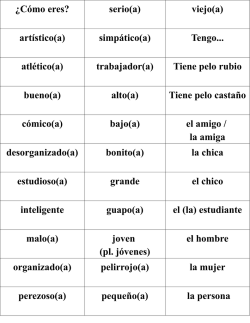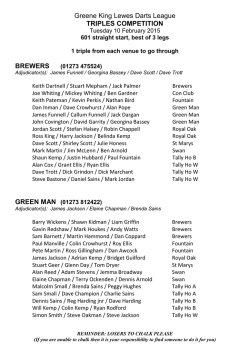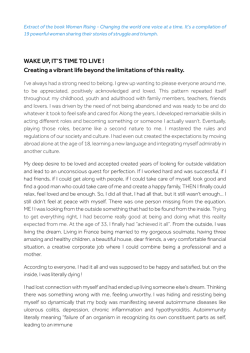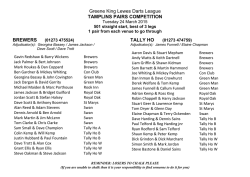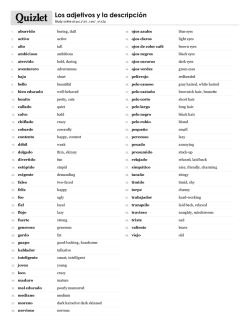
1 Sectile By Alison Cheng Two hours after the television showed her
Sectile By Alison Cheng Two hours after the television showed her washed up on the beach with her throat slit, my best friend is standing on my front porch, knocking to come in. I know it’s her: a) she’s the only person who would be knocking at 7 in the morning and b) it’s her knock—continuous and unending until I open the door. Not to mention I can smell her damn cigarette through the mail slot. The smell of tobacco mixes unpleasantly with the ever-present smell of the ocean and the extra-large omelet I have going on the gas-top. “Put it out.” She’ll hear me, since the place we rented here is just big enough for one and a half people and my kitchen is two steps from the front door. She mutters something under her breath, but the smell doesn’t go away, so I tighten my jaw and methodically finish chopping up the red pepper I’m adding to the omelet and start on the mushrooms. With this kind of thing, it’s just a matter of being more stubborn than she is. Her knocking pauses and her heel grinds into the boards of our porch, before her knocking resumes—it’s more resigned now. I know she hates not finishing at least one cigarette when she comes to. I almost feel bad, but those things smell terrible and tobacco destroys clothes. I take a deep breath as I reach the door, but when I open it, there she is, alive and standing on the porch. She looks sullen and waterlogged; her natural hair color is starting to show underneath the brown dye, one of her contacts is missing, and her clothes are an absolute wreck. But she’s alive, and even though I’d known what had happened when she vanished a week ago, and even though I’d cried over her (again), I am still relived. Funny how this is a routine I can’t ever get used to. I smile at her. 1 “Bitch,” she says, pushing past me into the kitchen. She flings herself into a chairs and kicks her feet up onto my dingy table in what seems like one motion. “You know, in some cultures, we say hello to each other,” I snip, shutting the door behind her. The paint crumbles under my fingers as I shove the deadbolt back into place and I brush the chips off on my jeans. I guess I should consider telling my landlord I’d like it repainted, but then shrug. Likely as not, I wouldn’t be able to enjoy it for long, if at all. “And you know I’m never going to let you smoke in the house. Quit trying. And get your feet off the table, that’s where breakfast is going.” I flip the omelet just at the right time—right when it’s starting to crisp up at the edges but is still the tiniest bit runny in the middle. People always forget that eggs still cook once you take them out of the pan, so they overcook and the poor eggs turn rubbery and horrible and then no one wants them. That’s what they were doing at the diner in this town before I started there. Now our eggs are the best in town. Everything is ready at the same time—eggs, toast, and coffee. She takes the plate I hand her and starts shoveling the food into her mouth like she hasn’t eaten in days—although, I guess she hasn’t. If it wasn’t for the fact that she still has a crescent scar on her throat, I’d call this just another day. But it’s not just another day, not even by our standards. As we finish eating, she breaks the silence through her last mouthful of eggs and mushroom to ask where I put her stuff, spraying little bits of yellow and gray over the table. I grimace in disgust, hand her a napkin, and go to grab her box from the back of the tiny hall closet. I work the box down from where I’d wedged it a few weeks ago—behind a box of random junk we’d never bothered to unpack when we moved into this house eight months ago. The closet probably wouldn’t win any awards at the World’s Best Hiding Spot competition, but 2 it’s not like we live in a place where we have to worry about police raids—just nosy neighbors and the occasional visit from door-to-door salesmen. The box doesn’t look like much, I guess. It’s just old cardboard held together by duct tape, but it’s probably the most important and damning thing in the house. Expect the girl sitting in my kitchen, I guess. Old pictures from our school days, passwords and key codes scribbled on sticky notes, clothing (the UPS uniform could stand a good wash,) our high school diplomas and the basics: hair dyes, colored contacts, wigs, more than a few pairs of glasses, and twice the makeup you could find in a Hollywood starlet’s trailer. When I get back into the kitchen, she’s put the dishes in the sink without any water and is flipping idly through a junk magazine I got a few days ago. She grabs her box as soon as I’m through the door and starts rummaging around, pulling things out and comparing them. I sigh and go about scrubbing the dishes, putting them away as she digs around for a new piece of herself. Or a new self entirely. It’s been so long I’m not sure anymore. I stay in the kitchen while she takes over the bathroom, cleaning herself up from her ocean adventure, then turning herself into another someone else. It’s a process. I hear her drop a shampoo bottle on the ground, then she starts to sing something I think I recognize, but I don’t remember the words to. I think about turning on the radio in the kitchen to drown her out, but decide against it—I’m comforted by these moments when she’s here and alive and doing things that are normal. I cherish moments like this. They don’t come along that often. While she’s busy, I count my tally marks again. I know she doesn’t really like that I keep count of everything—I think it’s hard for her to see all the times she’s failed marked down so simply—but, for me, it’s just a habit, a ritual. I have two sets—one for all the times she’s died and the other for all her returns. The third tally is when I was working as a waitress in a crummy 3 Italian chain restaurant in Boston and she was shot in the gut and bled to death in an alley. The eighth tally is the time I was spending my nights baking bread and pastries with the nicest old man who only spoke French, even though we were living in Santa Fe, and she had her head smashed against a cement block a couple dozen times. Then there’s the twelfth tally, when I took a job as a lunch lady at some public school, the worst job I’ve ever had, in Middle-of-Nowhere, Indiana, and she had her neck wrung like a chicken. The ninetieth tally is the time I had a job bartending at a nightclub in Las Vegas, making damn good money for a change, and she got shoved off the roof of a hotel. But she always comes back, finishes what she starts, usually trussed up in a nice little bow for the police officers and lawyers to deal with—either through a filmed confession turning up online or a file of evidence on a desk or an anonymous tip. And we move on—either because she’s heard about a problem elsewhere, or because we’re out of hair dye and colored contact combinations, and the neighbors are whispering to each other when I leave for work. Even the most drugged-out, oblivious people eventually notice a dead girl is wandering around. (We found that out in Portland, where I worked in a teashop and she got run over by a car—tally six.) And then the tallies even out. I even them now and realize—we’re on twenty full cycles of this. That’s about three a year since we left flowers on my father’s old headstone, said goodbye to her parents and hit the road six year ago. “Damn,” I whisper, “happy anniversary.” I hear the cursing start from behind the bathroom door and I hide my tallies as she flings the door open so it crashes into the wall (that’ll leave a mark, I hope we didn’t need our security deposit back.) The complaining starts before I can even see her face—she went blonde this time, really awfully blonde—and to top it off, she’s gone from hair that she could braid and still have 4 it go past her shoulders to an unevenly cut bob. It does look hideous, but we’ll both get used to it; the important thing is it looks different. But that doesn’t stop her from spending the next ten minutes spouting swear words directed at herself, her hair, me, the dye, the company, the directions and complaining about how fake her hair looks, and how she’s sure it’s about sixteen times thinner than it was thanks to the bleach, and how she doesn’t understand why anyone actually thinks this is a standard of beauty. (“Dammit, Colette, I’m a fucking Barbie!”) After a bit, she’s calmed down enough to try a new eye color (last time was green—she decides on a gray this time) and she glowers silently at herself in a cracked compact mirror as I take the scissors and even out her hairstyle so it looks good… or at least so that all the hair is close to the same length. Then I use bronzer and powder to highlight her cheek bones and narrow her nose—the fake tan she used last time is mostly washed off, so going pale makes sense. When I’m finished, she sticks her tongue out and pinches different parts of her face before admitting, “It’ll do.” “You’re welcome,” I roll my eyes. “Sorry,” she says, rubbing her eyes and blinking them a few times to get her contacts settled in correctly, “Thanks. Probably shouldn’t have tried that by myself.” “Probably not, no,” I say, sitting down across from her and flicking open the local paper, “What’s with the sudden desire for a flapper cut?” She grins sheepishly and points to her neck, “Long hair turned out to be a bigger disadvantage than I thought. Learned my lesson, though.” I shoot her a look, “I hope so.” She waves a hand like my comment is a fly buzzing around her, reaching for the computer, “Yeah, I know… it was a stupid mistake, that’s all. Don’t worry about it.” 5 “I’m serious,” I say, holding her gaze, “Don’t get cocky.” “Got it, Mom.” “I’m three months younger than you!” I protest. I can tell by her tone it’s useless to say anything else, so I bite my tongue and switch my gaze to an article about a local mom-and-pop donut store going out of business. I read a few more articles in the paper before deciding I really don’t care about the annual crab festival and begin perusing the cookbooks I picked up at a yard sale a couple weeks ago. She prints the press ID’s she uses sometimes with her new picture and then moves onto researching boat registration, taking breaks every now at then to stare at her reflection in the spoon she used in her coffee this morning, running her tongue over her teeth. We toss occasional remarks back and forth. She asks if there’s anything police report related in the paper, and I tell her nothing except the article about the unidentified girl who washed up on the beach. She glances it over, chuckles, then cuts out the article and puts it carefully in the box with the others she’s saved. I ask if she’d got a craving for anything specific for dinner, and she runs her hand through her hair before saying she’d love it if I could pick up “those weird Greek olives.” It’s almost what I’d call it peaceful, our little adaptation of normal. Before I know it, I’ll be late to my shift if I don’t leave in the next ten minutes. She leans back in her chair as I stand up and collect my apron and hat from the cupboard above the sink, and choose a cookbook at random from the overstuffed shelf to read during my twenty-minute break. I can barely wiggle it out and I make yet another promise to myself to part with at least a few of my cookbooks, instead of buying more. “So, who are you this time?” I ask, as I throw my apron and The Picayune Creole Cookbook into a tote that already contains my wallet and my father’s pocketknife. 6 She launches into a lecture on who she is: grew up in a small Georgian town, private high school, only child, member of the First Baptist Church of Augusta, and regular volunteer at the Red Cross—she’s got the pictures to prove it. As she talks, her voice slips comfortably into a sweet Southern drawl. It’s damn believable, even though we went to the same school in Pittsburgh until we graduated and she left for two weeks of college before deciding she didn’t need to know anything they had to teach her. But that’s not what I’d meant, and if I don’t cut her short, I’ll be here all day learning the names of her fake second-cousins. “I was looking for a name.” “Oh, yeah,” she says, “How’s Myra Andrew sound?” Her new accent throws me. “Sounds like after naming yourself twenty times, the idea pot runs a bit dry.” I joke. Myra shoots me a look and I wince, “I mean—” “Oh, shut up,” she says, “I know what you mean. Get going, you’re going to be late.” --The diner kitchen is loud, just the way it always is—the rhythm of pots and pans being slammed around and the yelling of orders (there’s no computerized ordering system,) bubbling, sizzling and boiling food, customers talking, and the obligatory jukebox playing songs that were popular in the seventies and are now only listened to “ironically” by teenagers in too-tight jeans. I’m working the grill with Rob, who’s nice enough but feels the need to be my friend—he’s always asking me kind of personal questions. I’m never thrilled when people do that and there’s always that one person who does, no matter where we go. All it means for me is having to remember which stories I’ve told this time. Did I say I was related to someone in town or that I’d run away from home? Did I say I was working here to save money for college or that I’d already 7 graduated with one of those borderline useless degrees? Did I say I was Colette Jackson or Colette Burkhart or Colette Hooper? Just makes everything more frustrating. “Bit warm outside for long sleeves, isn’t it?” he asks me cheerfully. “Just ‘cause you grew up in the frozen North doesn’t mean we all did,” I lie. “Everything north of South Carolina feels cold to me.” As I say that, bacon grease jumps off the industrial fryer we’re standing in next to and bounces onto his skin. He jerks his arm back reflexively, letting out some Spanish curse words. I laugh. “Plus, I don’t have to worry about that so much! I’m protected!” He laughs, too, sliding three strips of bacon onto a plate that I add two sunnyside-up eggs and a pancake to before shoving the plate onto the counter and yelling “Order 396 is up!” The diner’s a good place to work—friendly people, decent pay, a good menu. It’s not the best job I’ve held in the past six years, but it’s at least in the top ten. I like that there’s a rhythm to it. A number three combo has three eggs and a side of toast and sausage. A number seven is the tuna melt with potato chips and two pickles on the side if we like the customer, one if we don’t. The daily specials are always the same, week to week—Monday is tomato soup and grilled cheese, Thursday is the burger, and Sunday is all-you-can-eat waffles. It’s simple and predictable. Part of me hopes that Myra (Myra, her name is Myra now, if anyone asks her name is Myra, her name has always been Myra) decides to stay, but I know she won’t—she’ll fix whatever problem she’s found in this town and then she’ll be itching to move on. Oh well. Maybe wherever we end up next will have another diner. Who knows. When my break comes, I settle into an unoccupied booth at the back of the restaurant with The Picayune Creole Cookbook and review the recipe for chicken gumbo. Maybe I’ll make that for Myra and I tomorrow night. I pull out my phone and do a quick check of our bank 8 account. We’re up a bit—my paycheck was just deposited and it looks like a couple of the people who owe Myra either their lives or their businesses have coughed up some chump change for us—although, I guess I can’t complain, since it’s not like she charges them. I suppose I should just be grateful they feel any obligation to pay her back at all. I do some quick math, and it turns out I’ve got enough to splurge on some more luxurious food—maybe we’ll even be able to have steak sometime in the next month—rice has been getting a bit bland. Rob and another coworker named Jennie come over and sit with me for the last five minutes of my break. They ask if I heard the news about the body on the beach. I nod and say I caught a glimpse of it on the television this morning. I ask them what’s been said about it, and the answer’s nothing much. The police were expected to release a statement earlier but didn’t. Jennie thinks it’s because there hasn’t been any breaks in the case. “It’ll become one of those cold cases, I think,” she says, shaking her head, her eyes glistening with this new gossip that will spread around town for a few weeks and then die down. Rob shakes his head, “Like that girl that turned up with a broken neck in the woods a year or so back… tragedy. Heard her father started hitting the bottle a bit too hard after that. My buddy Andy, he works down at the bar on Riter Street, he says that man’s in there from open to close.” I nod sympathetically, but of course it’s not true. Myra (she was Hailey then) hasn’t contacted her parents in five years—that’s just how her life works. I know she misses them, but this keeps them safer. But that’s the way it is, especially in small towns—gossip’s not interesting unless people can add more to the story. Given time, the story will go from common knowledge to idle gossip to urban legend. Happens everywhere we go. So I just listen to how that story has evolved; I can tell Myra later. She’ll probably get a laugh out of it. --- 9 I get home from the market late at night with my arms so full of brown paper bags I can barely get the front door open. Myra’s not there. Not surprising. She’s probably trying to pick up the trail where she left it. I set the bags down on the counter, turn on the television, and stack some of her papers, trying to not look at them, and not at all succeeding. Directions to the boat basin, a list of everyone who keeps a boat in one of the marinas, several copies of official police reports (I don’t even want to know how she got her hands on those,) a couple blurry photos of what looks like a rowboat, and a small zip lock bag full of something I try really hard to convince myself is sugar but wouldn’t dare put in tea. I don’t ask about what she’s working on— usually, I don’t really want to know, I worry about her enough as it is. But honestly, she’s handled everything from serial killers to gang wars: this town can’t have anything worse than that. I tell myself that as I toss the newspaper showing a blurry image of her corpse on the beach in the trash bin. I put the groceries away and pour myself a glass of the cheap wine I picked up today as I sit at the table, trying to convince myself that I’m studying From Our Kitchens, (which is full of recipes I’d need a much bigger bank account to even attempt, but a girl can dream) but really I’m waiting for her to come back. Because she’s made some stupid mistakes recently and she just died again and you’d think I’d be used to it, but watching a friend die repeatedly isn’t the same as getting the chicken pox. You’re not immune after the first time. The clock ticks 360 degrees twice and two-thirds of the bottle is mysteriously gone before I hear her boots on the porch and I’m suddenly not relieved she’s still alive but frustrated and then angry because she can’t even take a night off to be safe and we’ve been running from city to city from state to state for six fucking years and neither one of us has ever had a job for more than seven months or owned a house or even had a regular friend because it has to be a 10 secret, it has to be our secret, after all, who would understand, who would believe us, they’d just lock us up, so we can’t have normal lives, and she knows it’s hard on me and it’s hard on her too, I should know, I’ve heard her cry and comforted her and cleaned up the smashed plates and bandaged her hands, but she can’t stop, she’ll never be able to, I could get out if I wanted but then she’d be all alone, she’d be all by herself and this world’s bad enough without a friend, I can’t do that to her, plus what have I got in the world besides her, she’s been my only family for years, what can we do, she has a gift and can use it to make the world a better place and we have to see the bigger picture because Colette, Jesus, can’t you see it’s about more than just us, that’s what her parents said, and she needs me with her, I’m the only one she trusts and can’t I see that she needs me as much now as she did when we first met, and of course I do, Myra, no, not Myra, you’re Kaylee, you were Kaylee when we first met and you had red hair that was cut too short because you’d tried to do it yourself when your mother didn’t have the time to but no, stop, don’t, that’s too dangerous, please Colette please, I’m sorry, I’m so sorry, Myra, I can be her friend, I can but I can’t do anything except try to protect her in some tiny little way, and she’ll say that’s enough but it’s not, she must be lying, she must be, because how can it be when she keeps dying and dying and dying and dying. And I’m suddenly not sure how much of this I’m thinking and how much I’m screaming because next thing I know, there are tears on my cheeks, Myra’s outside the bathroom door shouting for me to open it and seven tallies are oozing crimson on my arm. I drop my pocketknife and back away from it as though it’s a snake, but it’s too late and the pain is sinking in and I’m crying harder and I know Myra is crying too. She’s asking how she can help, but this is never ever something she’s supposed to see. She handles the world’s problems, not mine. 11 So I clench my jaw and stare at myself in the streaky mirror until the tears stop and I wash my face so that the only trace of my tears are my red eyes and then take a deep breath, hide the knife behind the toilet, pull down my sleeves and open the door. Myra is still crying, so I take her to the kitchen and make her hot cocoa, her go-to comfort drink, all the while telling her I’m fine, that it’s nothing, that she doesn’t need to worry. Promising that I’ll talk to someone (I won’t and she knows) and that I won’t do it again (I will and she knows). I pour the cocoa into her favorite mug, mix in two teaspoons of Nyquil while she’s blowing her nose and sit with her as she drains the mug. I clean up the broken glass of the wine bottle and make an attempt at pressing the wine out of From Our Kitchens with a dishcloth, but I know that it’s probably a lost cause. I decide to let it air dry overnight, just as Myra finishes her drink, and now she feels tired but she doesn’t comment on the medicinal aftertaste that I know it must have. I walk her up to bed, tuck her tightly under the covers and I stay with her until she starts to snore. I head back to the bathroom and quietly rinse the blood off my pocketknife and my arms, letting it wash down the drain, the water turning red and then pink and then clear as the knife turns back to silver. I look at my arms, counting the tallies there, making sure there are still forty—and there are. Only now, thirty three are the white and pink of faded and fading scars, and seven on my right arms are still seeping. I rub my thumb over them, smearing the blood and applying just enough pressure that I can convince myself I’m trying to let them scab and heal. Twenty cycles. I wonder if we’ll both make it to forty. 12
© Copyright 2026
